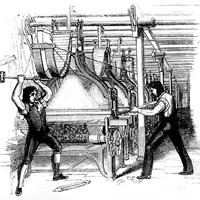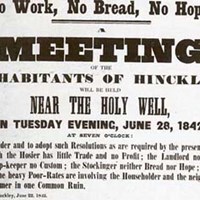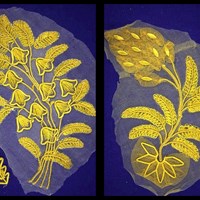In the Doldrums 1810 - 1850
The need for cheaper garments and lower wages led to riots and rebellions among workers resulting in the forming of the first knitting Trade Unions.
See objects from this period in our virtual museum.
Early framework knitters were a prosperous group. An average Nottingham framework knitter in 1714 earned 10 shillings and 6 pence for a four day week; those that produced fine embroidered work could earn as much as 20 shillings a week.
Find out moreThe Stocking Makers' Association for Mutual Protection, formed in 1776, was the first association in the knitting industry to formally represent the workers.
Find out moreAfter the strikes of framework knitters in the 1810s and 1820s, wages in common branches of the industry remained at a low level for a further twenty years. Reports highlighted the poor conditions faced by workers.
Find out more

